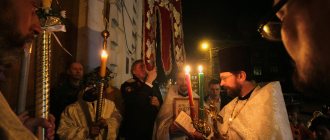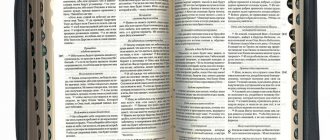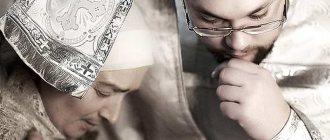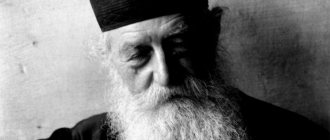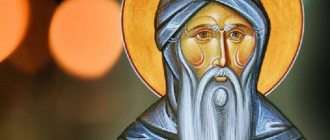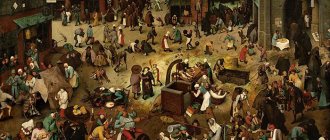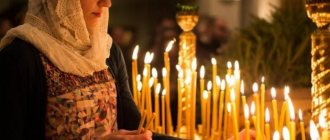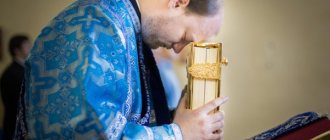What is the essence of Lent
The whole point of fasting is not at all in refusing certain types of food, but in cleansing the soul and abstaining from various entertainments. During the fasting period, you should watch less TV and surf the Internet. It is better to devote your free time to reading prayers or going to church. This time is favorable for thinking about your life and rethinking a lot.
It is necessary to get rid of all negative thoughts and forgive old grievances. You need to imagine that every day there is an opportunity to start everything from scratch. But to do this, you need to let go of the past.
Stichera for Monday of the 1st Week of Great Lent
Come diligently, having a strong weapon of fasting, like a shield, we will turn away all the intrigues of the enemy’s charms. We will not be scorched by the sweets of passions, nor will we be afraid of the fire of temptations, in the image of Christ the Lover of Mankind with the honors of patience crowns us. Having prayed with boldness, we fall down callingly, asking for peace, and great mercy for our souls.
“Let us come with zeal, holding the strong weapon of fasting like a shield, we will repel all the enemy’s machinations of the evil one, believers. Let us not be scorched by sensuality, we will not be afraid of fiery temptations, for the patience of which the philanthropic Christ will crown us with honors. And therefore, praying with boldness, we fall down to Him, crying out and asking for peace and great mercy for our souls.”
Morning and evening prayer during Lent
Believers begin their morning by reading a prayer. It will help create a positive attitude and protect you from various troubles.
“Lord God, be merciful to me, a sinner. Cleanse my soul from sins, deliver me from evil thoughts. Protect me from enemies and their atrocities. I believe in Your generosity and kindness that You give to us. Glory to You, God. Amen!".
During fasting, the day should also end with reading a prayer. It must be said every evening before going to bed.
“Lord God, creator of all life on earth and the King of Heaven, forgive me for the sins I have committed during the day in word or deed. Even in a dream, I, God’s servant, do not lose faith in You. I believe that You will save me from sins and cleanse my soul. Every day I hope for Your protection. Hear my prayer, answer my requests. Amen".
When you go to bed, you need to turn to your Guardian Angel with the following words:
“Guardian angel, protector of my soul and my body. If I have sinned this day, deliver me from my sins. Don't let the Lord God be angry with me. Pray for me, God’s servant (name), before the Lord God, ask him for the forgiveness of my sins and protect me from committing evil. Amen".
Morning and evening prayers must be read daily during Lent.
Stichera for Monday of the 1st Week of Great Lent
Come, damned soul with your flesh, confess to the Creator of all and remain the rest of your former speechlessness, and bring tears to God in repentance.
“Come, damned soul, with your body, confess to the Creator of the world and leave your former madness, and bring tears of repentance to God.”
Man has sinned more than all, the only one who has sinned is You: but as God, O Savior, have mercy on Your creation.
“I have sinned more than all people, I alone have sinned against You, but, Savior, be merciful as God to Your creation.”
Tears of a harlot, O Generous One, and I offer: cleanse me, O Savior, with Thy compassion.
From the Great Canon of Saint Andrew of Crete
What you can and cannot do during Lent
Church regulations determine what can and cannot be done during Lent. But since the life of a modern person differs from life in a monastery, not everyone is able to follow all the rules during the period of fasting. Each person must determine for himself the loads that he can handle.
During Lent, you need to give up food of animal origin. On the first day of fasting, you need to give up food altogether. In addition to refusing food, a person must limit himself in many ways. Despite the fact that there are many prohibitions on food, no one should starve themselves. Fasting should not harm your health and daily duties.
Fasting time should be devoted to spiritual life, so there is no need to waste it aimlessly. It is important to limit attendance at entertainment events and devote time to prayer. You cannot be offended by people; it is important to resolve all conflicts peacefully.
About the post
When you fast, do not be sad like the hypocrites, for they put on gloomy faces in order to appear to people as fasting. Truly I tell you that they are already receiving their reward. And you, when you fast, anoint your head and wash your face, so that you may appear to those who are fasting, not before men, but before your Father, who is in secret; and your Father, who sees in secret, will reward you openly. (Matthew 6:14-18)
True fasting is elimination of evil deeds. Forgive your neighbor's insult, forgive him his debts. “Do not fast in courts and quarrels.” You do not eat meat, but you eat your brother. You abstain from wine, but you do not restrain yourself from taking offense. You wait until evening to eat food, but you spend the day in court.
Saint Basil the Great
Are you fasting? Feed the hungry, give drink to the thirsty, visit the sick, do not forget the prisoners. Comfort the mourning and crying; be merciful, meek, kind, quiet, long-suffering, unforgiving, reverent, true, pious, so that God will accept your fast and bestow the fruits of repentance in abundance.
Saint John Chrysostom
In the coming days of Holy Lent, put yourself in order, make peace with people and with God. Contrite and cry about your unworthiness and your death, then you will receive forgiveness and find hope of salvation. God will not despise a contrite and humble heart, and without this, no sacrifices and alms will help you.
From the letters of Abbot Nikon (Vorobiev)
What prayers should not be read during Lent?
During the period of Lent, you are allowed to read any prayers; there are no prohibitions here. The only thing you need to do is read special prayers. First of all, you should read the prayer of repentance of Ephraim the Syrian. This prayer can be read daily. It is also important to pay due attention to the chants that can be heard at worship services.
There is an opinion that it is forbidden to read akathists during Lent, except for a few days. During the fifth week of Lent, the Akathist to the Most Holy Theotokos is sung in churches, and praise to the Mother of God is also heard. At this time, the Akathist to the Divine Passion of Christ is also read in churches.
On other days of fasting, akathists are not read, because many will not like the joyful mood of prayer at a time when people should regret the sins they have committed. Nevertheless, at this time, church life is already too busy.
As for the ban on reading any prayers during Lent, the charter says nothing about this. The only thing that needs to be given more attention is prayers of repentance. Every Christian will be able to read akathists at home. This is a period of striving for God, and prayer strengthens this striving. Anyone who wants to add akathists to their daily prayers can safely do so.
Three prayers for Lent
1. Troparions of repentance at Matins
“Open the doors of repentance, O Life-Giver, for my spirit will rise to Thy holy temple, the temple of my body is completely desecrated; but as you are generous, cleanse me with Your gracious mercy.
Instruct me in the path of salvation, O Mother of God, for my soul has been frozen with cold sins and my whole life has been spent in laziness; but through Your prayers deliver me from all uncleanness.
Thinking about the many cruel things I have done, O wretched one, I tremble at the terrible day of judgment, but hoping for the mercy of Thy mercy, as David cries out to Thee: have mercy on me, O God, according to Thy great mercy.”
Translation (author – Protopresbyter Alexander Shmeman):
“Open the doors of repentance for me, Giver of life, because from early morning my soul has been striving for Your holy temple, since the temple of my body is completely desecrated: but You, Generous One, cleanse me with Your mercy.
Guide me, Mother of God, on the path of salvation, because with shameful deeds I have desecrated my soul and spent and wasted all the days of my life in laziness: but through Your prayers, deliver me from all uncleanness.
Thinking about the many bad deeds that I, the unfortunate one, have committed, I tremble at the thought of the Day of Judgment. But, trusting in Your loving kindness, like David, I cry to You: have mercy on me, O God, according to Your great mercy.”
What kind of prayer is this
“Open the doors of repentance, O Giver of Life...” is the common name for the three repentant troparions*, which begin to sound in the church three weeks before the start of Lent, on the first of the so-called preparatory Sundays (in Church Slavonic - weeks) - on Sunday about the publican and the Pharisee. From this moment on, penitential troparia are heard at every Sunday service until the fifth week of Great Lent.
*Troparion is the shortest genre of church hymnology; a stanza or several stanzas, as a rule, outlining the essence of a holiday or other event, the feat of a saint, etc. - Approx. ed.
The place of these troparions is at the Sunday all-night vigil (which takes place on Saturday evening), after reading the Gospel and singing “Having seen the Resurrection of Christ...”.
In ordinary, non-Lenten times, we hear other words at this place of service:
“Through the prayers of the apostles, O Merciful One, cleanse our many sins.
Through the prayers of the Mother of God, O Merciful One, cleanse our many sins.
Have mercy on me, O God, according to Your great mercy and according to the multitude of Your mercies, cleanse my iniquity.
Jesus rose from the grave, as He prophesied, to give us eternal life and great mercy.”
Translation: “According to the prayers of the apostles, O Most Merciful One, cleanse our many sins.
Through the prayers of the Mother of God, Merciful One, cleanse our many sins.
Have mercy on me, O God, according to Your great mercy and according to the multitude of Your mercies, cleanse my iniquity.
Jesus rose from the grave, as He Himself predicted, and gave us eternal life and great mercy.”
But with the beginning of preparations for Lent, this chant is replaced by penitential troparia. In some temples, when singing, it is customary to turn off the lights and kneel down.
We can say that the penitential troparia of Matins express the main mood in which we find ourselves throughout Great Lent. Our main task during Great Lent is to bring repentance to God, that is, to try to see our sins and do everything in our power to lag behind at least part of these sins, to correct ourselves, to change for the better. In the repentant troparia, we admit to ourselves and to God that we desperately need help from above in order to bring such active repentance, we ask Him for strength for this and pray for mercy.
“The entire bodily temple is desecrated...” These words remind us that from the point of view of Christianity, man is called to become the temple of God, to purify his soul so much that it, together with his body, can become a container for the Lord the Holy Spirit. We, on the contrary, desecrate this temple daily, if not hourly, with evil thoughts, words and actions.
“I tremble at the terrible day of judgment...” Christians call the day of judgment the day of the Second Coming of our Lord Jesus Christ, when, according to the Gospel, He will come to earth surrounded by countless angelic forces and sit down to judge all people who have ever lived on earth (cf., for example .: Matthew 25:31-46). It is at this trial - the last and therefore terrible - that the final fate of every person will be decided. People who love God and strived for Him even during earthly life will live with Him forever in joy and bliss, and all opponents of God will inherit eternal separation from the Lord and endless suffering.
“Like David, I cry out to You...” David is the king of the Israeli people, who created a unified state in the 10th century BC; one of the greatest righteous people in human history before the coming of Christ. He is known, among other things, as the author of several dozen psalms praising God and turning to Him with prayers. One of these psalms, the fiftieth (“Have mercy on me, O God, according to Thy great mercy”), is an unsurpassed example of the repentant spirit.
The last time we hear the troparia of repentance is during the Saturday evening service in the fifth week of Lent. Next Saturday the Entry of the Lord into Jerusalem will be celebrated: Great Lent is left behind, Holy Week begins. The center of Holy Week is no longer our sins and repentance for them, but the Lord Jesus Christ Himself, the last days of His earthly life and suffering on the Cross. It is these events that should be given priority attention in the week preceding Easter, and penitential troparia on these days are no longer appropriate.
Who wrote this prayer and when?
Neither the author nor the time of appearance of the penitential troparions is precisely known. But the Church has known them at least since the 14th century: it was by this time that the composition of the Lenten Triodion, a liturgical book containing all the main texts for reading and singing during the days of Lent, was formed.
2. Prayer of St. Ephraim the Syrian
“Lord and Master of my life, do not give me the spirit of idleness, despondency, covetousness and idle talk. Grant the spirit of chastity, humility, patience and love to Thy servant. To her, Lord, King, grant me to see my sins and not condemn my brother, for blessed are you forever and ever. Amen".
Translation: “Lord and Master of my life! Do not give me a tendency to idleness, to despondency, to lust for power and idle talk. Grant the spirit of chastity, humility, patience and love to me, Your servant. Yes, my Lord and King, let me see my own sins and not condemn my brother; for You are blessed forever and ever. Amen".
What kind of prayer is this
The prayer of Ephraim the Syrian is read at all weekday services, starting from the evening of Forgiveness Sunday (but before that on Wednesday and Friday of Cheese, or, popularly, Maslenitsa week) and until Holy Wednesday inclusive. It perfectly shows the essence of repentance: it is not enough to repent of sins, you need to try to replace everything that is inappropriate and bad in your heart with virtues that are opposite in spirit. Switch, so to speak, from the minus sign to the plus sign.
This prayer consists of three groups of petitions: first, we ask God to weaken in us the effect of idleness, despondency, lust for power, idle talk - those passions that especially interfere with setting the heart to repentance; Next, we ask for the most necessary things to revive our soul - chastity (that is, spiritual integrity and purity), humility, patience and love for others. The ending of the prayer is the quintessence of the Orthodox attitude towards oneself and others: “Grant me to see my sins and not condemn my brother.” After all, none of us can correct another, only ourselves (and then with God’s help).
Why is the emphasis placed on these passions and virtues?
“Idleness,” writes Protopresbyter Alexander Schmemann in his book “Lent,” is our main ailment and the root of all sins. It is that strange laziness and passivity of our entire being that always drags us down... constantly convincing us of the impossibility, and therefore undesirability, of changing anything. This is truly a deeply rooted cynicism in us, which responds to every spiritual call: why? and thanks to which throughout our lives we waste the spiritual powers given to us.
Dejection is the fruit of idleness: in the grip of despondency, a person is deprived of the opportunity to see anything good or positive; for him everything comes down to denial and pessimism. Such a person is a constant interlocutor of the devil, who constantly lies about God and about the world, filling life with darkness and denial.
Lust for power, that is, love for power, enters our lives under the influence of laziness and despondency. After all, as Father Alexander Schmemann explains, “if my soul is not directed towards God, does not set itself the goal of eternal values, it will inevitably become selfish, self-centered, and this means that all other beings will become means for satisfying its desires and pleasure.” Lust does not always prompt us to command other people; it can also be expressed in indifference, contempt, lack of interest, attention and respect for other people. But in both cases, people are viewed as pawns, objects of our environment, and not as valuable individuals in their own right.
Finally, idle talk is when the gift of speech, received by a person from God, is used for other purposes. The word, which can become a powerful creative tool, a means of saving one’s neighbor and establishing God’s truth, in practice reinforces the spirit of idleness, despondency and covetousness and acquires enormous destructive power.”
“Chastity is the opposite of idleness,” continues Father Alexander Schmemann, “if idleness means dispersion, division, fracture of our opinions and concepts, our energy, the inability to see things as they are, in their whole, then chastity is, first of all, integrity, correct hierarchy human strengths and abilities. Humility is the fruit of such a holistic view of the world: only the humble are able to live in truth, see and accept things as they are, and thanks to this see God's greatness, kindness and love for everyone.
Patience is born from humility: only a person who has fallen in his natural nature is impatient, quick to judge and condemn others and, guided by incomplete, broken, distorted concepts, wants life to become immediately successful for him. And the closer we get to God, the more patient we become, the more we reflect in ourselves the careful attitude and respect for each individual being characteristic of God alone. Finally, love is the highest gift, the goal of our entire spiritual path, and it is precisely this that is asked at the end of the prayer of Ephraim the Syrian.”
The modern charter of the Russian Orthodox Church provides for the reading of this prayer, as a rule, with 16 bows - four to the ground and 12 from the waist. After the first group of petitions, we make one prostration; after the second - another one; Having said the final part of the prayer, we make the third prostration; then we make 12 bows from the waist, each time adding: “Lord, have mercy on me, a sinner”; finally, we say the entire prayer once again and make a final bow to the ground.
Who wrote this prayer and when?
Church tradition considers the author of the prayer to be St. Ephraim the Syrian. He was born at the beginning of the 4th century in the very east of Syria, which was then part of the Byzantine Empire. From childhood, the young man was raised in the faith; he was personally acquainted with some Syrian confessors and martyrs for Christ. A number of life circumstances (in particular, imprisonment on false charges) strengthened his decision to devote his life to preaching repentance.
The future saint retired to the Nisibin Mountains, where Syrian Christian hermits lived, studied the word of God, and became a skilled preacher and theologian. Towards the end of his life, St. Ephraim founded a theological school for the study and interpretation of the Holy Scriptures. Until the end of his days he served as a deacon, lived in poverty and bequeathed to be buried as a beggar wanderer.
Researchers of the work of Ephraim the Syrian are not firmly convinced that the prayer of repentance belongs to him. It is included in a collection of Greek translations, which, although inscribed with the name of Ephraim the Syrian, date back to the 7th–8th, or even 10th centuries at the earliest. Earlier versions of these texts have not yet been found.
3. “May my prayer be corrected...”
“May my prayer be corrected like incense before You,
the lifting of my hand is the evening sacrifice.
Lord, I called to You, hear me:
Hear the voice of my prayer, always cry out to You.
Set, O Lord, a guard over my mouth, and a guard over my mouth.
Do not turn my heart into words of wickedness, and do not bear the guilt of sins.”
Translation: May my prayer be directed like incense before Your face,
the lifting up of my hands is like the evening sacrifice.
Lord, I called to You, hear me,
listen to the voice of my prayer when I cry to You.
Set a guard, O Lord, over my mouth, and a guard against my lips.
Do not turn my heart towards vicious words and invent excuses for sins.
What kind of prayer is this
This amazingly beautiful chant is performed at the Liturgy of the Presanctified Gifts, which is celebrated throughout Great Lent on Wednesdays and Fridays, as well as on some other days of fasting (for example, on the days of remembrance of the 40 Martyrs of Sebaste, the First and Second Finding of the Head of John the Baptist, on Thursday the fifth weeks of Great Lent after reading the Great Canon). The place of this song is immediately after reading the proverbs, that is, fragments from the Old Testament (the books of Genesis and the Proverbs of King Solomon).
Most often, “May my prayer be corrected...” is sung by clergy and clergy in three voices: they go out onto the solea, stand in front of the open Royal Doors and slowly sing verse by verse, and after each verse the choir repeats the original stanza: “May my prayer be corrected, as incense before You, the lifting of my hand is the evening sacrifice.” Traditionally, the entire temple kneels at this time.
This is one of the most memorable moments of the Liturgy of the Presanctified Gifts, clearly distinguishing it from the liturgy of John Chrysostom that is familiar to us. In fact, it is from this moment that the liturgy proper begins: the reading of the proverbs also refers to Vespers, which turns into the Liturgy of the Presanctified Gifts.
“May it be corrected...” is a prayer for the gift of prayer, for it to be correct before the Lord, so that it rises directly to Him like smoke from incense. It is characteristic that the priest at this moment stands in the altar and censes the altar, and then (after the third verse is sung) moves to the altar, on which stand the previously consecrated Holy Gifts, and censes before Them.
And this is also a prayer that our lips and hearts do not create obstacles for us when turning to God, so that we do not deviate into idle talk or crafty self-justification. We can say that this song is a kind of prayerful preparation for the concentrated, attentive, thoughtful utterance of the prayer of Ephraim the Syrian, which follows and contains petitions to God, which we have already discussed above.
“The mention of the evening sacrifice refers us to the ancient worship in the Tabernacle of the Covenant - a camp temple, the predecessor of the majestic Temple of Jerusalem, built by King Solomon in the 10th century BC. In front of the entrance to the tabernacle there was a copper altar, on which every evening a lamb was supposed to be burned in addition to other sacrifices that the people made, as a rule, wanting to avoid punishment for the sins they had committed,” recalls St. John Chrysostom.
The priests were commanded and decreed by law, when no one offered (sacrifices), to offer and burn one lamb in the morning and one in the evening; the first sacrifice was called the morning sacrifice, and the last the evening sacrifice. This was commanded to do by God, who inspired by this that one must serve Him unceasingly, both at the beginning and at the end of the day.
Such a sacrifice, Chrysostom continues, was always favorable to God, in contrast to sacrifices for sins, which could be displeasing if offered without a heartfelt disposition. “The psalmist asks that his prayer be like this sacrifice, not desecrated by any uncleanness of the offering, like this incense - pure and holy,” concludes Chrysostom.
If you strictly follow the rules, then the Liturgy of the Presanctified Gifts must be celebrated in the afternoon, after Vespers. Now, due to modern living conditions, this instruction is rarely followed, but in some places they still serve this way, for example, in the churches of the Orthodox St. Tikhon Humanitarian University (Moscow, Likhov Lane, 6). In this case, our prayer at the Liturgy of the Presanctified Gifts literally turns out to be an evening sacrifice.
Who wrote this prayer and when?
“Let my prayer be corrected...” - these are the first lines of Psalm 140, written by the future king David at a time when he had to hide from the envious and irritable king Saul (see 1 Samuel 19:24). Saul suspected his servant and son-in-law David, the famous conqueror of the enemy strongman Goliath, that he wanted to deprive him of royal power.
But David had no intention of harming Saul in any way. And this psalm (like many of David’s) is a heartfelt appeal to God, imbued with the realization that only God can deliver the psalmist from the unjust royal wrath. “David understands that although he is not guilty of what he is accused of, his other sins are enough to bear punishment from the Lord,” notes priest Dimitry Vydumkin. Therefore, he asks the Lord to put guard on his lips, so as not to become embittered against the enemy, asks not to allow his heart to deviate towards self-justification.
In Christian worship, this psalm began to be used a long time ago - we hear verses from it during the singing of stichera on “Lord, I have cried” at Vespers (including the very one that precedes the Liturgy of the Presanctified Gifts). “It can be assumed... that the repeated singing of these verses goes back to the earliest period of the celebration of the Liturgy of the Presanctified Gifts,” writes Protopresbyter Alexander Schmemann in the book “Lent.”
That is, already by the 6th–7th centuries, when the first information appears about the celebration of a special evening liturgy with communion with previously prepared Gifts. “It is possible that in those days when this liturgy had not yet acquired its current solemnity and consisted simply of communion at Vespers, these verses were sung during communion,” suggests Father Alexander.
And today they call us to gather our minds together and pray to God for real, with heartfelt attention and without guile.
Source: foma.ru
***
Mikhail Olegovich Orlov, Doctor of Philosophy, Dean of the Faculty of Philosophy of Saratov State University, SPDS teacher:
— I re-read the Holy Scriptures during fasting, especially the book of Genesis and the book of Job, and exclusively in Church Slavonic. And, of course, also psalms and the Lenten Triodion. The books of the Old Testament and the Gospel are correlated with the literature that is studied in the subjects “Sacred Text and Religion” by religious scholars in the second semester. Practical classes and seminars on this subject fall just during Lent.
The “Ladder” of St. John the Climacus is especially helpful during Lent. I read this deep text every time as if it were all over again. I believe that there is no more successful book that tells about how a person and his soul works. I would recommend that students read, first of all, the Gospel. You can start with the book “On the Church without Prejudice. Conversations with a secular journalist" by Abbot Nektary (Morozov) and Elena Balayan, which was published by the publishing house of the Saratov Metropolis.

